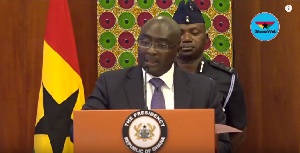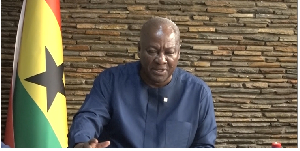From September one, Ghana will implement new measures and sanctions at the ports to meet international standards in fulfillment of the Government's determination to enhance efficiency towards national development.
The measures include the removal of internal customs barriers within the country, mandatory joint inspections as well as ensuring a paperless port.
A statement released by the Government, on Wednesday, and copied to the Ghana News Agency, the Government said after broad consultations with the relevant stakeholders a number of measures were set to be introduced at to improve efficiency and make the ports more user-friendly.
These were announced by Vice President Mahamudu Bawumia on May 17.
It said Agencies or service providers who were not ready to go paperless by September 1, would not be allocated any cargo.
Strict sanctions, the statement said would be imposed on declarants who presented falsified documents.
'There will be a two-strike rule of first a punitive fine and second a complete ban.'
On the removal of internal customs barriers, it said: 'These barriers will be redundant in the long-term with the introduction of the First Port Rule in Ghana. 'Duties will be paid on goods destined for re-export and with the new automated gate opening system at the port, which will be linked to the risk engine.
'No vehicle will be able to leave the port without paying their duty. In the short term, they will be replaced with occasional patrols.'
On Mandatory Joint Inspections, it said: 'From September 1, this year, we are not going to physically open and inspect all containers. We are introducing a risk engine which will assign risk levels to importers based on their level of compliance.
'When the need arises for inspections, the agencies needed for the inspections will be informed about the inspection time and place for joint inspections and they will have to sign in on an electronic device at the inspection shed to confirm their participation.'
Ongoing paperless at the port, it said: 'With the help and cooperation of all the stakeholders at the port, we have mapped out a process flow, which will take effect from the 1st of September 2017. Agencies and stakeholders presented paperless process flows, which we merged into a process flow that will enable compliant importers to sit in the comfort of their offices or homes and get customs clearance.'
The statement said the Government's goal within the next six months was to have a robust risk engine which would grant customs clearance in a maximum of four hours.
'Dubai Customs is able to grant customs clearance in one-and-half seconds and so Ghana can definitely aim for four hours instead of the current system of days and weeks.'
A National Risk Clearance System, it said, would be introduced to include Pre-Clearance, Clearance and Post Clearance Processes, fed by data from all systems. Compliant importers would get customs clearance in real time while non-compliant importers would go through scanning and physical inspection.
'All activities of importers will be fed into the system to enable us build risk profiles for importers.'
On the implementation of risk clearance system at the pre-arrival stage, it said, 'This will make it possible for compliant importers to sit in the comfort of their offices and get customs clearance.'
The statement explained that the introduction of First Port Rule in Ghana 'provides the avenue for the duty of goods destined for countries like Burkina Faso, Mali and Niger to be paid here in Ghana.
'This should provide a check on the dumping of goods destined for our neighboring countries in Ghana.'
On Automation, it explained: 'Terminals, which are not ready for automation by 1st September will be left behind and people who do not comply will be sanctioned. Every activity by importers will be fed into the risk engine as we build risk profiles for importers and exporters.'
On the Scrapping of Long Room, it explained: 'Customs Technical Services Bureau and Customs Compliance will be merged at the pre-arrival stage.
For the Introduction of a signature, the statement said: 'The Customs Classification and Valuation Report declaration will be enhanced with a declaration statement and electronic signature by the declarant. A false declaration will come with sanctions.'
On Bonded Warehouses, it said it was the: 'Introduction of a system, which will link the number of warehousing days to an importer's bond or confirmed LC. 'Once the warehousing days expire, the system will automatically call on the confirmed LC or bond based on how much duty is owed the government. We will not accept the practice of allowing goods to overstay in bonded warehouses.'
On Inspection and Testing, it said: 'The Ghana Standards Authority will be responsible for all inspection and testing activities at the ports except for products regulated by the Food and Drugs Authority, which include food, drugs (medicines), cosmetics, household chemical substances, medical devices and tobacco and tobacco products where the Food and Drugs Authority will undertake inspection and testing and share data with the appropriate agencies.'
On Joint Inspection, it explained: 'Joint Inspection by regulatory agencies will be managed as part of the National Risk Management System supported by an HS Code Management System and Task Manager for coordination and confirmation of the inspection officer's attendance.'
Business News of Thursday, 3 August 2017
Source: GNA

















